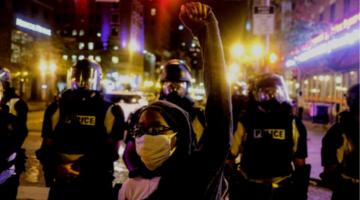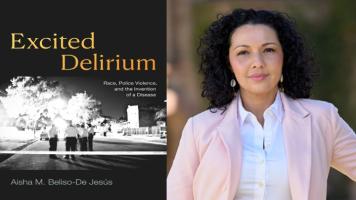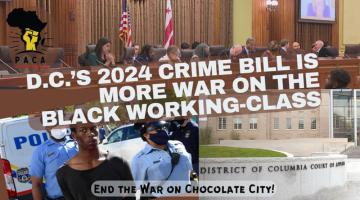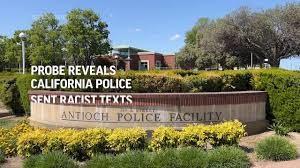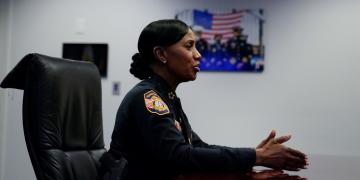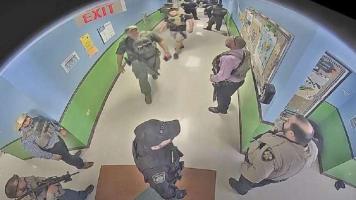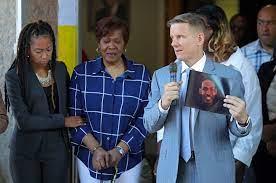Patrick Lyoya's parents at Grand Rapids, Michigan press conference on April 14, 2022 (Photo: Bill Pugliano/Getty Images)
Police in the United States kill an average of three people every day and one of those persons will be Black. Patrick Lyoya was one recent victim of a police execution.
In a country where cops kill Africans for passing bad currency, selling cigarettes, playing with toy guns, watching television in their homes, and even sleeping peacefully in their beds, it is no surprise that a white Grand Rapids, Michigan police officer chased, straddled, and at point-blank range, shot Patrick Lyoya, a 26-year-old father of two small children, simply because he walked away from an officer after being pulled over for having a bad license plate.
Many watched in horror last week as the police showed videos of the killing of this brother from Congo that occurred, ironically, on April 4th - 54 years to the day after a bullet took the life of Dr. Martin Luther King, Jr.
Michigan is no stranger to killings of this kind. In 2012, a 49-year-old homeless Black man named Milton Hall, who had mental health challenges, was the target of a firing squad execution by Saginaw, Michigan police officers. Hall stood alone in an empty parking lot, ranting about mistreatment by a store clerk, when the officers taunted him with a leashed canine. When Hall declared he had no fear of the dog, waved a pocketknife, and challenged the officers to let the dog come at him, the cops raised their rifles and fired more than 40 rounds at the brother. Although the murder was vividly captured by a police car dashboard camera, and was investigated by both county and federal prosecutors, no charges were filed against the killers.
The Lyoya death sparked the usual calls for reforms, transparency, civilian oversight, training, discipline, etc. But, as usual, missing from the discussion are the psycho-social and economic dynamics that drive the longstanding pattern of killing those Africans summarily found guilty of the crime of “contempt of cop.” Law enforcement administrators can do everything to change policies and rules, but until they disable the personal, internal engines that drive the cops’ violent racism, the killings will continue.
In Lyoya’s case, the first evidence of the real problem is seen when, after several demands for production of driving credentials, Lyoya began to walk away. His demeanor and facial expressions suggested confusion, frustration, and an interest in simply removing himself from the situation. At that critical moment, the cop should have simply allowed Lyoya to walk away. Instead, not only did he grab him, but he also gave chase when Lyoya broke the grip and attempted to flee.
In Baltimore, Chicago and a growing number of other cities, police departments have concluded that foot pursuits are so hazardous that they should be avoided when possible, and in cases like Lyoya’s, prohibited. If the brother had been allowed to leave, the cop had not only Lyoya’s car, but also access to his passenger. Both made it possible for Lyoya to be identified, located, and re-engaged later under less stressful conditions.
Also, there was no evidence that Lyoya posed a danger to anyone. He was stopped for a vehicle infraction. In the case of Tennessee v. Garner, the Supreme Court prohibited what happened to Lyoya – the use of deadly force on a non-threatening fleeing suspect.
Progressive law enforcement policies and the Supreme Court’s limitations on the use of violence do nothing to deter the many killer cops who have needlessly taken African lives. Black folks understand intuitively why that happens, but perhaps because so many are at a loss as to what should be done, many disregard historical context when, as part of their advocacy they propose reforms that have no chance for success.
We must remain ever mindful of historian Charshee McIntyre’s observation that: “In the late18th and early 19th centuries, just being an African American in and of itself represented a crime in many ways.” She added: “Social customs demanded that Blacks exhibit deference or submissive behavior in the presence of whites. So speaking insolently to or displaying disrespect toward any white persons represented a legal offense…” This was especially true with respect to white police officers.
As we know, these social rules continued into the 20th century. Law professor Randall Kennedy recounted: “When Charles McLaurin, an organizer with the Student Nonviolent Coordinating Committee (SNCC) was jailed in Columbia, Mississippi, a patrolman asked him, ‘Are you a Negro or a nigger?’ When McLaurin responded, ‘Negro,’ another patrolman hit him in the face. When he gave the same reply to the same question, McLaurin was again beaten.”
Thus, the idea of Africans’ total subservience to police officers became a central feature of law enforcement culture that survives to this day. It is a feature that cops believe they must preserve and enforce at all costs, up to and including the use of deadly force. This is made easier when white cops convince themselves Africans have no human rights because they believe, like a Detroit cop who described Detroit’s predominantly Black residents as “zoo animals,” that Africans are not human. To that point, journalist Alexander Cockburn wrote: “Responding to complaints about a string of choke-hold deaths, [former Los Angeles Police Chief Darryl] Gates blamed them on the physiology of blacks: ‘We may be finding that in some blacks, when [the choke-hold] is applied, the veins or arteries do not open as fast as they do on normal people.’”
Within this historical context, it is completely understandable that when Patrick Lyoya defied a police officer’s command and engaged in a physical struggle to prevent himself from being tasered, the cop’s socialization compelled him to punish such insolence, and to punish it with death.
The tragic irony is that Lyoya’s family relocated to the U.S. to escape violence in Congo. However, Patrick Lyoya found, much like Momodou Lamin Sisay from Gambia who was killed by Georgia cops; Botham Jean of St. Lucia who was killed in his Texas apartment; Nasir Abdi of Somalia who was killed by Ohio cops; and Amadou Diallo of Guinea who was killed by New York cops, that when it comes to killing Black people, police officers have a Pan-African perspective.
What is to be done? Body cameras, civilian review boards, cultural competency training and more Black police officers will not save us from racist white cops. They and their racist police culture can’t be rehabilitated. Quite simply, they must be discarded and replaced by emergency response agencies that employ psychologists, drug treatment specialists, mediators, auto mechanics and others with skills to respond to suicide attempts, drug overdoses, neighborhood squabbles, car breakdowns and the other emergencies that are most common in most cities. If armed “soldier cops” are to be retained, their numbers must be radically slashed, and they must be controlled by the community as they respond only to the most violent crimes.
Finally, we must understand that racist policing would not persist if it did not enjoy the support of the capitalist system. That’s because though frequently distracted and confused, Africans globally have displayed greater analytical clarity and militancy than many populations, and their potential to disrupt global capitalist hegemony is substantial. African communities that are battered and bruised by police are less likely to organize against corporate exploitation of the natural and human resources of Africa and the continent’s diaspora. Nevertheless, with God’s guidance and inspiration, that is precisely what the African World must do despite the violence imposed by police departments, intelligence agencies and military forces.
Mark P. Fancher is a Michigan-based attorney and writer. He can be contacted at mfancher[at]comcast.net.

